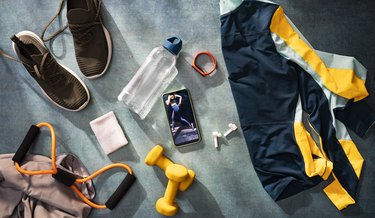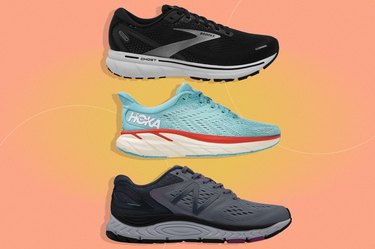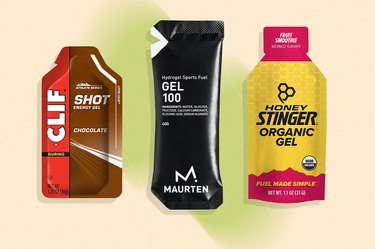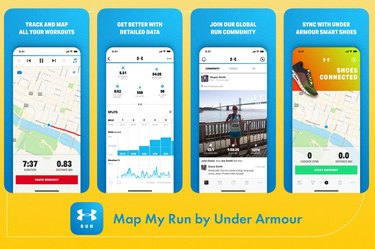
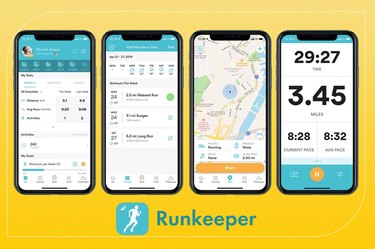
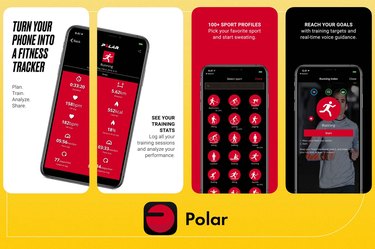
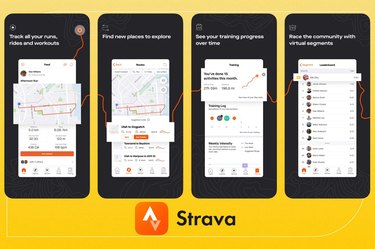
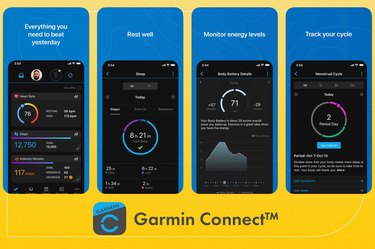
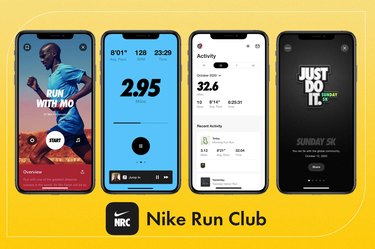
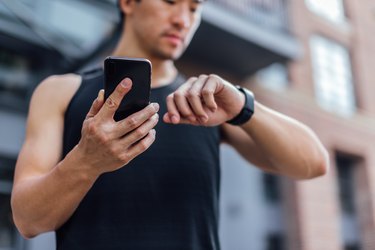
If you've signed up for a 13.1, you might be wondering: Are there apps to train for a half-marathon? There absolutely are — and the right one can help you nail your miles when you begin a training plan.
"Apps can help runners train for a half marathon in quite a few ways," Jason Fitzgerald, a USA Track and Field-certified coach and author of 101 Simple Ways to Be a Better Runner, tells LIVESTRONG.com.
Video of the Day
Video of the Day
Apps can help map out your plan's run distances, paces and recovery days. And with check-ins and social features, they can keep you motivated through all of those long runs.
The Best Apps for Half-Marathon Training
- Best for First-Timers: Asics Runkeeper [free (basic), $39.99/year (premium); iOs, Google Play]
- Best for Support: Nike Run Club (free; iOs, Google Play)
- Best for Socializing: Strava [free (basic), $5/month (premium annual plan); iOs, Google Play]
- Best for Improving Form: Map My Run by Under Armour [free (basic), $29.99/year (premium); iOs, Google Play)
- Best for GPS Tracking: Garmin Connect (free; iOs, Google Play)
- Best for Data: Polar Flow (free; iOs, Google Play)
How We Chose
If you're lost in the app store and not sure which way to turn, it's only natural to wonder: What is the best half-marathon training program? We talked with top run coaches to ID the best apps for half-marathon training — plus, how to find the right fit for your running needs and budget.
We chose our top picks based on their recommendations and criteria, including:
- GPS tracking capabilities
- Data offered
- Running level
- Support from other runners and virtual coaches
- Price
1. Best for First-Timers: Asics Runkeeper
Set your race date, distance and goals. Get your program to make it happen. Then track your progress. It's as simple as that with the Runkeeper (free) basic plan.
Or, for $39.99 per year, the premium version gets you a more personalized plan. The app, courtesy of Asics, uses data from thousands of runners and races, along with your running stats, to create a your perfect online training plan.
"My favorite feature is all of the different workouts you can choose from," Alain Saint-Dic, CPT, a coach with Runkeeper, tells LIVESTRONG.com. For instance, you can train by pace, duration or repeat distances. You can also pick a goal-focused plan or use the custom workout builder to set your own path.
Plus, Runkeeper has been doing some pretty cool stuff to keep runners connected. To get in some shorter races during your training season, check out virtual team marathons and races. They let you complete legs of the course and then tag in (and track) your teammates.
Download it: iOs, Google Play; Price: free (basic); $39.99/year (premium)
2. Best for Support: Nike Run Club
Nike Run Club is one of the best free half-marathon training apps out there, and it's ideal for runners craving support and guidance, says Trevor Franklin, CPT, a New York City-based certified personal trainer and runner.
Here's how it works: You choose a run plan based on how many weeks you have until race day. Then, each of your running workouts has a standard and guided version available. Choose guided ones to run with a Nike coach in your ear and get tips and words of encouragement along the way.
You can also choose to do speed, distance, treadmill and long runs, depending on how you're feeling that day. The app even has "tough day easy runs" to help you recover when you're dragging. Try listening to an inspiring athlete's story during the run to help keep you going.
Download it: iOs, Google Play; Price: free
Strava contains all of the must-have tracking features you'd expect from any great running app, but it stands out for its social features.
The coolest one is the ability to run the same paths as your friends, even at different times, Lindsey Clayton, a senior instructor at Barry's in New York City and cofounder of the Brave Body Project, tells LIVESTRONG.com. You can track your time to compete against both yourself and other runners.
Then, for a $5-per-month annual membership, you can subscribe to a 6- to 12-week half-marathon training plan. Each comes in beginner, intermediate and advanced versions.
Pair the app to a running watch or heart rate monitor for the most detailed stats. All your activity goes onto your feed, where friends can give you "kudos" for runs well done.
"Another feature of the paid version is Beacon, which lets Strava athletes send a text message to up to three safety contacts letting them know about their run," Clayton says. "The message includes a link to a live GPS-tracked map, so the contact can track a runner's progress. As a female runner, I think this is a really important feature, especially if I'm going out on a solo run."
Download it: iOs, Google Play; Price: free (basic); $5/month (premium annual plan)
4. Best for Improving Form: Map My Run by Under Armour
Map My Run tracks pace, distance and more — just like most solid running apps. But true tech and data lovers can also sync it to their shoes for feedback on exactly how they're running. You can even get details on your cadence and stride length!
To take advantage of this perk, you need a pair of Under Armour smart shoes, like the UA Flow Velociti Wind 2 Running Shoes (UnderArmour.com/mens, UnderArmour.com/womens; $160).
But no matter the shoes you're wearing, Map My Run puts all of your stats to good use with personalized technique feedback from top run coaches. If competition fuels you, you'll be happy to know the data also lets you race your friends, Franklin says.
For a fully customized race half-marathon training schedule, choose the MVP version for $29.99 per year.
Download it: iOs, Google Play; Price: free (basic); $29.99/year (premium)
5. Best for GPS Tracking: Garmin Connect
If you already have a Garmin device, the (free) Garmin Connect app is a no-brainer to complement your training regimen.
"The main reason I love it is the GPS tracking," Franklin says. Because the app uses the Garmin device's GPS rather than the phone's tracking, it's super accurate, he says.
Once you've paired the app with your device, sign up for Garmin Coach. Pick your race distance and goal (run or walk and pace per mile), current fitness level, amount of days you work out and the date of your race. The Forerunner 45S is a solid base-level running watch that works with Garmin Coach (Garmin.com; $139.99).
Then, for true personalization, choose one of three coaches to guide you throughout your training. They'll give advice that's unique to you. Meanwhile, your program automatically adjusts based on your performance during recent runs and workouts.
Buy it: iOs, Google Play; Price: free
6. Best for Data: Polar Flow
Polar Flow is free, but you need a Polar smartwatch or heart rate monitor to use it. Fortunately, Polar makes some of the best running watches. The Polar Vantage M2, for example, even tracks sleep, recovery and gives you nutrition tips (Polar.com; $299.95).
Once you have a Polar device, the companion app provides awesome, responsive programs for half-marathons. It pulls your data, lets you add details on your goals, then creates a plan that uploads straight to your watch. The app analyzes your performance to tweak your program throughout your training and even predict your finish time.
"I feel that Polar provides the best opportunity to connect data to the training plan, accurate GPS tracking of run routes, time, splits and heart rate," Kelvin Gary, CPT, owner of Body Space Fitness in New York City, tells LIVESTRONG.com. And even with all of these bells and whistles, Polar Flow is very easy to use.
Buy it: iOs, Google Play; Price: free
Comparison Chart
Runkeeper | Nike Run Club | Strava | Map My Run | Garmin Connect | Polar Flow |
|---|---|---|---|---|---|
Beginner-friendly | Guided workouts with coaches | Connect with other runners | Cadence and stride length details | Uses GPS tracking | Detailed data tracking |
Free and paid versions | Free | Free and paid versions | Free and paid versions | Free | Free |
Can run virtual races | Can listen to runners' stories in app | Runner-safety features | Pairs with Under Armour smart shoes | Connects with Garmin smartwatch | Need a Polar smartwatch or heart rate monitor |
Pre-set or custom training plans | Features "tough day easy runs" | Social media feed | Feedback from coaches | Feedback from coaches | Predicts half-marathon finish time |
7 Questions to Ask Before Downloading a Half- Marathon Training App
1. How Much Time Do You Have to Train?
Before you officially start training for a half-marathon (and download a training app), you should have an idea of how long you'll need. After all, long-distance races are a commitment. The timeframe for half-marathon training is about 12 weeks, according to Hal Higdon's training plans. (FYI: Hal Higdon is an accomplished runner, coach and author.)
But how long does it take for a beginner to train for a half-marathon, and is it different from intermediate and advanced runners? While Hal Higdon's training plans for beginners are also 12 weeks, you may want to allow yourself a few more weeks of training if you've never raced the distance before to build up some extra strength, endurance and confidence.
If you come across a race you really want to sign up for but it's approaching quickly, you may be wondering: Can I run a half-marathon without training? The short answer: It's ill-advised. Training plans include cross-training and ramping up your mileage incrementally for a reason: so you don't get injured. It's best to aim for a race you have plenty of time to train for.
2. Where Will You Be Training?
Before downloading a half-marathon training app, you may want to consider where you'll be running. If your race is hilly or on gravel or trails, you want to train on that type of terrain.
If bad weather keeps you indoors or you can't get outside for any reason, you may be wondering: Is treadmill training OK for a half-marathon and, if so, how do I train for one indoors? You can absolutely train for a 13.1 indoors. Just keep in mind running outside and running on a treadmill is a bit different.
A landmark 1996 study in the Journal of Sports Sciences suggests you bump up your treadmill incline to 1 percent to make up for the lack of air resistance indoors. You'll also want to make sure you run on more of an incline and add in some declines if you know your race isn't flat.
But a treadmill can get boring, especially if you're logging longer distances, so here are a few other tips to make your indoor half-marathon training more fun:
- Catch up on your favorite shows
- Curate a motivational playlist
- Listen to a podcast or audiobook
- Catch up with friends
3. How Much Coaching Do You Want?
Almost any running app can let you track your workouts. But when you're training for a 13.1-mile race, you likely want one that also provides training guidance, Fitzgerald says. You just have to decide how much.
Do you want a straightforward beginner training plan or a responsive program that adapts based on your run times and progress? What do you think about a coach giving you audio tips during your runs?
4. What Motivates You?
Motivation is also a big plus of the best half-marathon training apps — especially for those new to the distance, Fitzgerald says. So what will help you stick to your plan: check-ins, badges, messaging, data? Everyone is different. Choose an app you think will inspire you.
5. What Data Do You Want?
Depending on how seriously you take your race-day performance, you may want to track more specialized stats, Fitzgerald says. Consider heart rate, stride length and cadence. With some apps that pair to smartwatches, you can even keep tabs on your sleep and recovery.
6. What's Your Budget?
Yes, free always sounds better than paid. But if you're looking to get the most out of a training app and plan, unlocking paid features can make a big difference in your overall experience if you can afford it, Fitzgerald says. Most paid apps do have a free basic version, though. So test these out before investing.
7. Does It Require Other Products to Use?
What other pieces of running tech do you already have? Or are you willing to buy a new watch or heart rate monitor? Knowing what products a training app syncs with (and which it requires) is a must. The last thing you want is to download an app and realize you can't use it.
Shop More Running Gear for Your Upcoming Race
Was this article helpful?
150 Characters Max
0/150
Thank you for sharing!
Thank you for your feedback!

